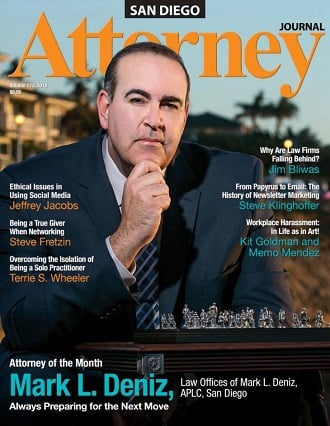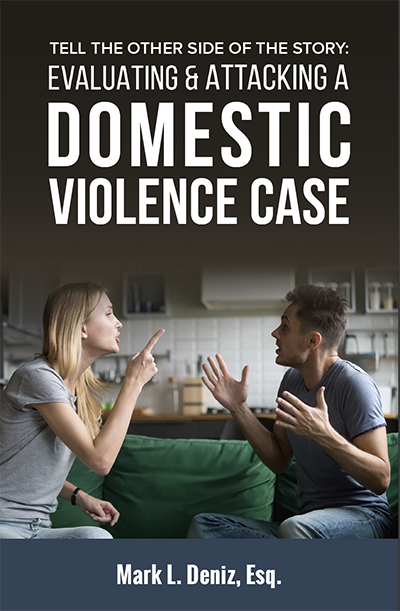Get Immediate Help From A Former Senior Domestic Violence Prosecutor Who Knows How To Win
Mark Deniz is a former domestic violence prosecutor, with over 20 years’ experience in criminal law. That behind-the-scenes knowledge helps our team tell your side of the story and take effective action to get charges dismissed or reduced.

Get The Case Dismissed Before It Gets To Court
By acting quickly to get a strong and experienced domestic violence defense lawyer on your side, many domestic violence charges can be dismissed before they even reach a court. With a strong start out of the gate, our lawyers can challenge the other side’s evidence and take steps – such as preparing mitigation packets – to build your case for dismissal or a reduced charge. Their success in doing this can be seen in the many positive reviews, testimonials and awards that our attorneys have received.
San Diego’s Premier Domestic Violence Defense Firm









Right
Right Experience
Mark Deniz has practiced in criminal law for 20 years, including a decade on the other side of domestic violence charges. He has good relations with the judges and prosecutors in these specialized courts.
Right Solutions
Our team works to “put a face to the case” and tell your side of the story. We are problem solvers who exhaust every defense and mitigating factor. Our mindset is to find an appropriate answer to the unique challenges you’re facing.
Right Now
We understand how stressful and urgent your situation is. We know that early intervention could make all the difference in the outcome of your case. Our lawyers and staff are ready to take swift action on your case.
For You
Facing Domestic Violence Charges? Tell Your Side Of The Story
It is incredibly unfair when police come into your home and arrest you on domestic violence charges without even getting your side of the story. At Premier Domestic Violence Law Group, we begin by listening to your side. Our experienced San Diego-based domestic violence defense attorneys will do everything in their power to tell your story, protect your rights and problem-solve your situation to get you a favorable outcome for your case.
Read Mark Deniz’s New Book on Domestic Violence
Often, I see clients like you who have been arrested or accused of spousal abuse, domestic battery, violating a restraining order, and other DV charges. They often feel what happened doesn’t warrant charges or the punishment that they are facing. In my new eBook, I share a few testimonies of such experiences from people who feel the same way and are realizing that their story was not fully heard. My book demonstrates that there are solutions and ways to get the best possible outcome after being charged with domestic violence (DV).
– Mark Deniz
Practice Areas


Free Case Evaluation From An Ex‑Prosecutor
Our founding attorney was formerly a senior prosecutor for San Diego domestic violence cases. From his 10 years prosecuting the accused, Mark Deniz knows how to defend against these life-altering changes and has created a firm dedicated to that end.
We offer free consultations so that you can know right away where you stand and what we can do to help. Call 619-752-3702 today and complete our brief online form.
We remain open and steadfast in our commitment to helping our clients during these difficult days.
Client Testimonials
-Taylor E.
-Anonymous.
-Scott P.
Proven Results
Dismissed
Felony Domestic Violence PC 273.5
May 2024
Dismissed
Domestic Violence Penal Code 243(e) battery on a spouse or significant other
May 2024
Misdemeanor with classes and fines only
Felony Criminal threats– Penal code 422
May 2024
Dismissed
Felony Domestic Violence PC 273.5
February 2024
Dismissed
Domestic Violence Penal Code 243(e) battery on a spouse or significant other
February 2024
Outcome of case:
Dismissed
Felony Assault with force likely to cause great bodily injury – Penal code 245(a)(4)
February 2024
Outcome of case:
Dismissed
Felony Domestic Violence
PC 273.5
January 2024
Outcome of case:
Dismissed
Domestic Violence Penal Code 243(e) battery on a spouse or significant other
January 2024
Outcome of case:
Dismissed
Domestic Violence Penal Code
594(a)(b)(1) Vandalism
January 2024
Outcome of case:
Dismissed
Felony Domestic Violence
PC 273.5
October 2023
Outcome of case:
Dismissed after classes
Domestic Violence Penal Code Section 243(e) and child endangerment 273ab
October 2023
Outcome of case:
Dismissed
Domestic Violence
Penal Code 273.5
October 2023

